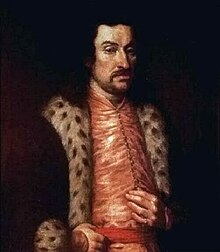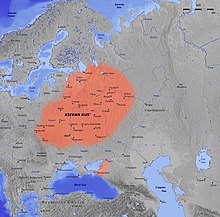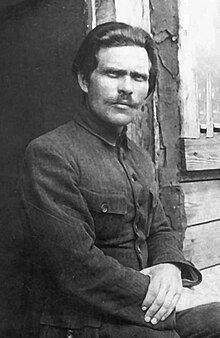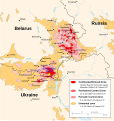Portal:Ukraine
The Ukraine Portal - Портал України
Ukraine Україна (Ukrainian) | |
|---|---|
| ISO 3166 code | UA |
Ukraine is a country in Eastern Europe. It is the second-largest European country after Russia, which borders it to the east and northeast. It also borders Belarus to the north; Poland and Slovakia to the west; Hungary, Romania and Moldova to the southwest; with a coastline along the Black Sea and the Sea of Azov to the south and southeast. Kyiv is the nation's capital and largest city, followed by Kharkiv, Dnipro, and Odesa. Ukraine's official language is Ukrainian.
During the Middle Ages, Ukraine was the site of early Slavic expansion and the area later became a key centre of East Slavic culture under the state of Kievan Rus', which emerged in the 9th century. The state eventually disintegrated into rival regional powers and was destroyed by the Mongol invasions of the 13th century. The area was then contested, divided, and ruled by a variety of external powers for the next 600 years, including the Polish–Lithuanian Commonwealth, the Austrian Empire, the Ottoman Empire, and the Tsardom of Russia. The Cossack Hetmanate emerged in central Ukraine in the 17th century, but was partitioned between Russia and Poland, and absorbed by the Russian Empire. Ukrainian nationalism developed and, following the Russian Revolution in 1917, the short-lived Ukrainian People's Republic was formed. The Bolsheviks consolidated control over much of the former empire and established the Ukrainian Soviet Socialist Republic, which became a constituent republic of the Soviet Union when it was formed in 1922. In the early 1930s, millions of Ukrainians died in the Holodomor, a human-made famine. The German occupation during World War II in Ukraine was devastating, with 7 million Ukrainian civilians killed, including most Ukrainian Jews.
Ukraine gained independence in 1991 as the Soviet Union dissolved, and declared itself neutral. A new constitution was adopted in 1996. A series of mass demonstrations, known as the Euromaidan, led to the establishment of a new government in 2014 after a revolution. Russia then unilaterally annexed Ukraine's Crimean Peninsula, and pro-Russian unrest culminated in a war in the Donbas between Russian-backed separatists and government forces in eastern Ukraine. Russia launched a full-scale invasion of Ukraine in 2022. Since the outbreak of war with Russia, Ukraine has continued to seek closer ties with the United States, European Union, and NATO.
Ukraine is a unitary state and its system of government is a semi-presidential republic. A developing country, it is the poorest country in Europe by nominal GDP per capita and corruption remains a significant issue. However, due to its extensive fertile land, pre-war Ukraine was one of the largest grain exporters in the world. Ukraine is considered a middle power in global affairs, and the Ukrainian Armed Force is the fifth largest armed force in the world in terms of both active personnel as well as total number of personnel with the eighth largest defence budget in the world. The Ukrainian Armed Forces also operates one of the largest and most diverse drone fleets in the world. It is a founding member of the United Nations, as well as a member of the Council of Europe, the World Trade Organization, and the OSCE. It is in the process of joining the European Union and has applied to join NATO. (Full article...)
In the news
- 19 November 2024 – Russian invasion of Ukraine
- Attacks in Russia during the Russian invasion of Ukraine
- Ukraine launches ATACMS ballistic missiles at targets in Bryansk Oblast, Russia, according to the Russian Defence Ministry. It is the first time that Ukraine has used the American-supplied missiles to strike targets inside Russia. (BBC News)
- Military aid to Ukraine during the Russo-Ukrainian War
- The United Kingdom and France both prepare new military packages containing long-range missiles to send to Ukraine following United States President Joe Biden's decision to allow deep strikes into Russian territory using American weapons. (Newsweek)
- U.S. President Joe Biden approves of sending non-persistent anti-personnel mines to Ukraine, with Ukraine committing to not use them in areas with civilians. (Al Jazeera)
- Nuclear risk during the Russian invasion of Ukraine, Russia and weapons of mass destruction
- Russian President Vladimir Putin signs a decree that allows Russia to use nuclear weapons in response to conventional attacks by a non-nuclear state supported by a nuclear power. (Reuters)
- 18 November 2024 – Russian invasion of Ukraine
- Russian strikes against Ukrainian infrastructure
- Odesa strikes
- Russian forces launch a missile attack on the city of Odesa, Ukraine, for the second consecutive day, killing at least ten civilians, injuring dozens of others and damaging civilian infrastructure, including residential buildings. (Ukrainska Pravda)
Featured pictures
Did you know (auto-generated)

- ... that Volodymyr Kozhukhar, the chief conductor of the National Opera of Ukraine in Kyiv, led Lysenko's opera Taras Bulba and Shchedrin's ballet Carmen Suite?
- ... that Hanna Dmyterko was among 34 Ukrainian women who fought in World War I?
- ... that Ukrainian museum director Horpyna Vatchenko forced the Hermitage Museum to abide by its agreement and return the Kernosovskiy idol after a loan?
- ... that Ukrainian activists squatted Viktor Yanukovych's opulent clubhouse at the Mezhyhirya Residence?
- ... that Ukrainians Nadia Smyrnytska, Maria Kalyuzhnaya and Maria Kovalevska joined other prisoners in committing suicide to protest against the abuse of imprisoned women in Kara katorga?
- ... that street artist TVBoy, known for his murals of footballers in Barcelona, painted uplifting art in regions of Kyiv ahead of the one-year anniversary of the 2022 Russian invasion?
More did you know -
- ... that Ukrainian naturalist, lecturer, artist and author John Lhotsky was credited as the first discoverer of gold in New South Wales?
- ... that journalist Savik Shuster who used to work for Russian TV channels now prefers to work for the Ukrainian TV because he felt the Russian Government was limiting his journalistic freedom?
- ... that according to legend, a tunnel leads from the Kamianets-Podilskyi Castle to the Khotyn Fortress which is 20 kilometres (12 mi) away?
- ... that the Khreschatyk is the main street of Ukrainian capital Kyiv on which Orange Revolution and other historical events mainly took place?
- ... that at its first years Kiev Zoo had to move its animals into the food storage of the main Kiev railway station for the winter?
- ... that the Privat Group is one of the few Ukrainian companies that own industries in the United States?
Selected article -

Ukraine emerged as the concept of a nation, and Ukrainians as a nationality, with the Ukrainian National Revival which began in the late 18th and early 19th century. The first wave of national revival is traditionally connected with the publication of the first part of "Eneyida" by Ivan Kotlyarevsky (1798). In 1846, in Moscow the "Istoriya Rusov ili Maloi Rossii" (History of Ruthenians or Little Russia) was published. During the Spring of Nations, in 1848 in Lemberg (Lviv) the Supreme Ruthenian Council was created which declared that Galician Ruthenians were part of the bigger Ukrainian nation. The council adopted the yellow and blue flag, the current Ukrainian flag.
Ukraine first declared its independence with the invasion of Bolsheviks in late 1917. Following the conclusion of World War I and with the Peace of Riga, Ukraine was partitioned once again between Poland and the Bolshevik Russia. The Bolshevik-occupied portion of the territory became the Ukrainian Soviet Socialist Republic, with some boundary adjustments. (Full article...)
In the news
- 19 November 2024 – Russian invasion of Ukraine
- Attacks in Russia during the Russian invasion of Ukraine
- Ukraine launches ATACMS ballistic missiles at targets in Bryansk Oblast, Russia, according to the Russian Defence Ministry. It is the first time that Ukraine has used the American-supplied missiles to strike targets inside Russia. (BBC News)
- Military aid to Ukraine during the Russo-Ukrainian War
- The United Kingdom and France both prepare new military packages containing long-range missiles to send to Ukraine following United States President Joe Biden's decision to allow deep strikes into Russian territory using American weapons. (Newsweek)
- U.S. President Joe Biden approves of sending non-persistent anti-personnel mines to Ukraine, with Ukraine committing to not use them in areas with civilians. (Al Jazeera)
- Nuclear risk during the Russian invasion of Ukraine, Russia and weapons of mass destruction
- Russian President Vladimir Putin signs a decree that allows Russia to use nuclear weapons in response to conventional attacks by a non-nuclear state supported by a nuclear power. (Reuters)
- 18 November 2024 – Russian invasion of Ukraine
- Russian strikes against Ukrainian infrastructure
- Odesa strikes
- Russian forces launch a missile attack on the city of Odesa, Ukraine, for the second consecutive day, killing at least ten civilians, injuring dozens of others and damaging civilian infrastructure, including residential buildings. (Ukrainska Pravda)
Selected anniversaries for November
- November 11—November 12, 1918 — Battle of Przemyśl was fought between Polish and Ukrainian forces.
- November 24, 2007 - the official day of remembrance for people who died as a result of Holodomor and political repression.
Photo gallery
Related portals
Religions in Ukraine
Post Soviet states
Other countries
WikiProjects and collaborations
Associated Wikimedia
The following Wikimedia Foundation sister projects provide more on this subject:
-
Commons
Free media repository -
Wikibooks
Free textbooks and manuals -
Wikidata
Free knowledge base -
Wikinews
Free-content news -
Wikiquote
Collection of quotations -
Wikisource
Free-content library -
Wikiversity
Free learning tools -
Wikivoyage
Free travel guide -
Wiktionary
Dictionary and thesaurus



![Image 1 The Dvorichna settlement hromada (Ukrainian: Дворічанська селищна громада, romanized: Dvorichanska selyshchna hromada, Russian: Дворичанская поселковая община) is a hromada in the Kupiansk Raion, Kharkiv Oblast, Ukraine. The hromada was created on 12 June 2020, and is centrally administered by the urban-type settlement of Dvorichna, being the local government for 55 settlements. The pre-war population of the hromada was small, and the economy was largely agriculture-based with little industry. As of 2024[update], the hromada remains about half occupied by Russian forces as a result of the Russian invasion of Ukraine, and has been severely depopulated because of a mandatory evacuation that has been issued for all civilians in recaptured areas. (Full article...)](http://upload.wikimedia.org/wikipedia/en/d/d2/Blank.png)




























































